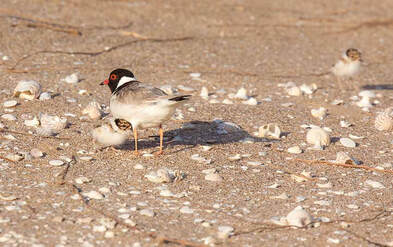 Mother plover and chicks. Photo: Glenn Ehmke,
Mother plover and chicks. Photo: Glenn Ehmke, courtesy of Birdlife Australia
BASS Coast’s Friends of the Hooded Plover are shining a spotlight on these vulnerable and much loved local birds as part of International Plover Appreciation Day on Monday (September 16).
The day is aimed at raising awareness of the plight of ground-nesting plovers who share our beaches, including Inverloch, Cape Paterson, Harmers Haven, Williamsons and Kilcunda.
The day is aimed at raising awareness of the plight of ground-nesting plovers who share our beaches, including Inverloch, Cape Paterson, Harmers Haven, Williamsons and Kilcunda.
In the lead-up to Monday’s event, BirdLife Australia is hosting an information session on hooded plovers at the Bunurong Environment Centre in Inverloch from 2-3:30pm on Saturday September 14.
BirdLife Australia beach nesting expert Grainne Maguire said hooded plovers were particularly vulnerable because they nest on beaches, where humans like to relax.
“When many people think of plovers they think of the masked lapwings which nest on grassy areas – they are the birds that might swoop you at the local footy oval.
“Hooded plovers are one of Australia’s priority threatened species and lay their eggs directly on beaches during spring each year, with both mum and dad plovers working together to raise chicks. Both species are just trying to protect their young.”
Ms Maguire said migratory species of plover were due to return from their marathon flight from breeding grounds in Siberia. When they land they need to spend long periods feeding undisturbed so they can replenish their energy in time to make the trip back.
“We can help these birds raise their families or get ready for their return migrations by taking care when we are sharing space with them. That includes keeping dogs on leads and keeping out of areas when the birds are nesting.”
BirdLife Australia beach nesting expert Grainne Maguire said hooded plovers were particularly vulnerable because they nest on beaches, where humans like to relax.
“When many people think of plovers they think of the masked lapwings which nest on grassy areas – they are the birds that might swoop you at the local footy oval.
“Hooded plovers are one of Australia’s priority threatened species and lay their eggs directly on beaches during spring each year, with both mum and dad plovers working together to raise chicks. Both species are just trying to protect their young.”
Ms Maguire said migratory species of plover were due to return from their marathon flight from breeding grounds in Siberia. When they land they need to spend long periods feeding undisturbed so they can replenish their energy in time to make the trip back.
“We can help these birds raise their families or get ready for their return migrations by taking care when we are sharing space with them. That includes keeping dogs on leads and keeping out of areas when the birds are nesting.”